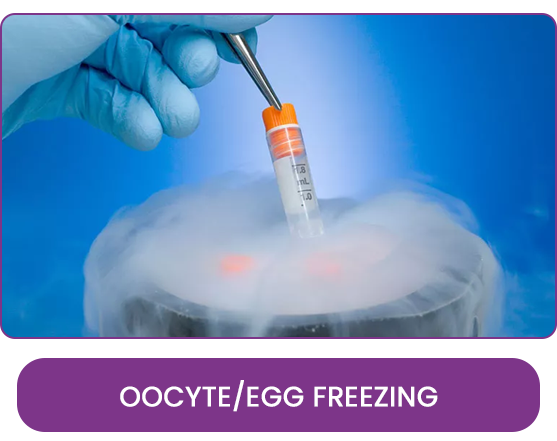Dr. Jyoti Bali: Best IVF Doctor in Delhi NCR

It is a process wherein a women’s eggs(oocytes) are retrieved, frozen and stored in order to preserve the reproductive potential in women of reproductive age thereby, giving her freedom to decide when she wants to marry and start a family.
At the Top Fertility Centre in Delhi NCR, we offer state-of-the-art egg freezing services, ensuring safety, precision, and care at every step. As the Best Fertility Clinic in Delhi NCR, our experienced specialists use cutting-edge technology to help women take control of their reproductive future with confidence.
- The fertility specialist assesses the ovarian reservein order to get an idea of the potential yield of oocyte before the ovarian stimulation cycle.
The assessment includes hormone analysis, majorly AMH, FSH,LH and Estradiol along with a pelvic ultrasound which gives an estimate of the Antral Follicle Count(AFC).This helps decide the dose of medication
- The ovarian stimulation protocol is same as that is used with in vitro fertilization(IVF), using injectable hormonal medications
- Finally, when enough follicles are stimulated and are of optimum size(i.e., 18mm-22mm), the follicles are then aspirated under ultrasound guidance as in an IVF procedure without any cut or suture.
- Then, the maturity of the oocytes is examined under the microscope and only those which are mature are frozen(cryopreserved) in liquid nitrogen tanks.
How is Oocyte freezing done?
When the woman is ready to use those frozen oocytes and conceive, these cryopreserved eggs are thawed(or warmed) and assessed for survival. Those oocytes that survive the freeze-thaw process are further fertilized with sperms using ICSI (Intracytoplasmic Sperm Injection). Finally, the fertilized eggs are cultured until the embryos are ready to be transferred into the uterus to achieve pregnancy, usually by 3-5 days after fertilization.
What are the indications for oocyte freezing?
- Fertility is affected in case of cancer patients requiring chemotherapy and/or pelvic radiation therapy
- Any kind of surgery or disease that might cause damage to the ovaries.
- Risk of premature ovarian failure because of chromosomal abnormalities (e.g. Turner syndrome, fragile X syndrome), or family history of early menopause.
- Genetic mutations that require removal of the ovaries altogether (e.g. BRCA mutation).
- Preservation of fertility for social or personal reasons to delay childbearing.
What do we expect from you?
- Know the technology.
- Get the procedure done before your 35th
- Stress Management
- Avoid Alcohol and smoking.
- Avoid junk and processed food.
- Follow exercise regimen.
- Spread the word to your friends, family and relatives
